Fayetteville expects to spend half a billion to reduce city flooding. Here are the plans
Note: A subheadline in the text of this article has been changed to correct an error. The Blount’s Creek flood mitigation project is not the first flood mitigation project underway. The city announced and began other projects in 2022.
It will cost Fayetteville more than half a billion dollars to reduce the flooding that often hits the city and sometimes inundates large areas, according to reports the city staff presented to the City Council on Sept. 5.
The city does not have the money for most of the flood mitigation projects. The City Council voted unanimously to have the staff of the Public Services Department seek grants and other funding sources to pay for them. They are estimated at $580.6 million — and that price doesn't include the purchase of land needed for the projects.
The city staff told the council the mitigation efforts will not stop all flooding. However, the projects are expected to protect roads and buildings around Fayetteville by reducing the depth, duration and extent of the floods. The city’s floods come from a network of creeks and the Cape Fear River.
LIST: 46 Fayetteville neighborhoods at risk of floods
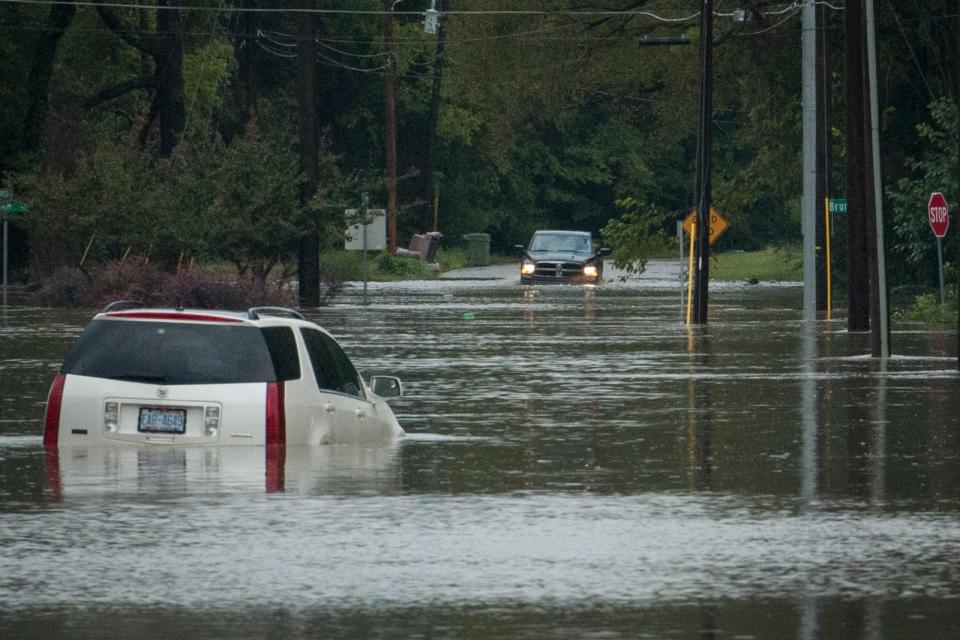
Blount’s Creek anti-flooding project to be built in 2027
One of the anti-flooding projects, estimated at $21.6 million, is underway with survey and design work, the city announced Sept. 5. It is to make improvements along 4,000 feet of Blount’s Creek, which runs through the southeast side of Fayetteville. The project includes replacing bridges over the creek at Person Street (for $3.9 million) and Russell Street ($12.8 million for two road bridges and one railroad bridge) on the outskirts of downtown with bigger, longer overpasses.
Blount’s Creek jumped its banks amid widespread city flooding in September 2016 and again, much more severely, during Hurricane Matthew in October 2016. The creek and its tributaries inundated areas from Robeson Street toward the downtown area, and it collapsed a chunk of Gillespie Street.
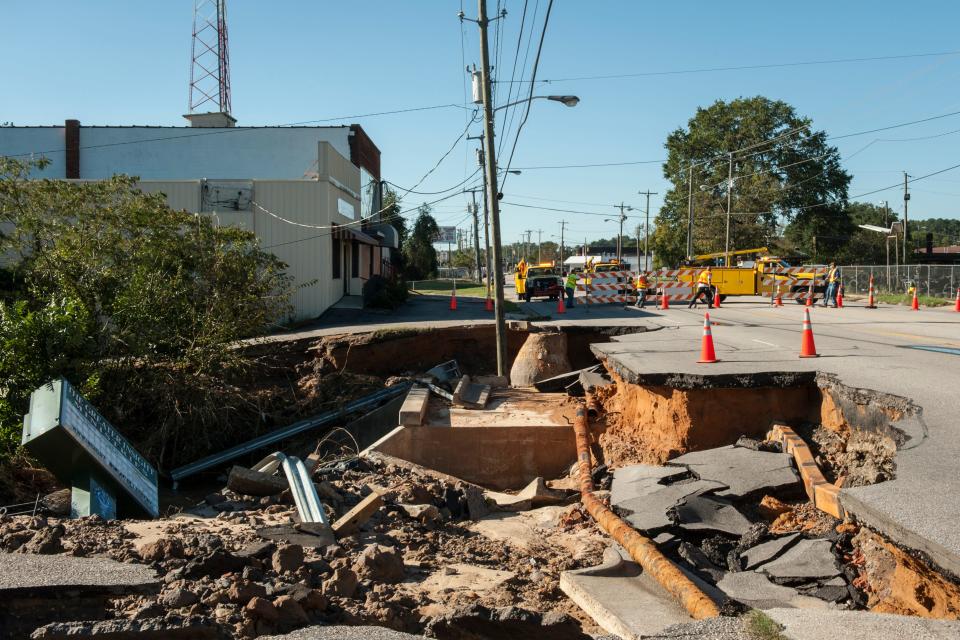
Fayetteville is a finalist for a $15.4 million federal Building Resilient Infrastructure and Communities grant to help cover the $21.6 million Blount's Creek mitigation project, city spokesman Loren Bymer said. The city anticipates it will receive the grant, he said. The remaining money is to come from a $200,000 grant from the North Carolina Golden LEAF Foundation and from the city, a city document says.
The city expects to break ground in late 2025 and finish the project in 2027, city spokesman Devon Smith said.
$307.6 million for 100 projects to reduce flooding
The Blount’s Creek watershed covers 6.22 square miles. Including the 4,000-foot Blount’s Creek mitigation and bridge project, the Public Services Department proposed 100 projects to address flooding in that area of Fayetteville at a total cost of $307.6 million.
A few of these projects:
Install bigger culverts at Cliffdale Road near Fayetteville Academy, at a cost of $1.4 million, to stop water from overtopping the road during a 50-year flood event.
Bigger storm sewers in the Highland Country Club vicinity along Raeford Road, for $1.8 million, to reduce flooding on the street during a 10-year flood.
Bigger storm sewers in the Blount’s Creek area of South Cool Springs Street, Butler Street, Alexander Street and McDaniel Street, near the Salvation Army Shelter near downtown, would reduce flooding to the streets and buildings. These are estimated at $1.3 million.
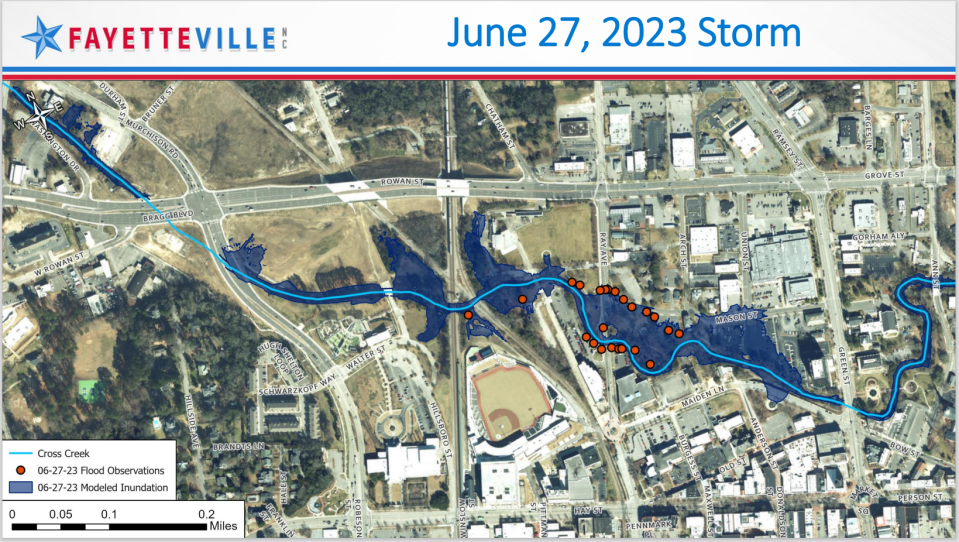
Make Cross Creek deeper, and use Roses Lake
Cross Creek floods the downtown area of Festival Park relatively often. Sometimes the flooding extends to Murchison Road and other parts of town.
During major storms, Cross Creek has covered roads and damaged buildings. During Hurricane Matthew, it became a torrent.
To reduce the flooding, City Council backed a plan to do two things:
Use the former Roses Lake (also called Rose’s Lake and Rose Lake) in the Hillendale West neighborhood off Rose Hill Road to capture stormwater during major storms. Cross Creek runs through the swampy remnants of the lake. The lake would remain empty except when it is needed to prevent flooding. This project is estimated at $10 million.
Spend upwards of $50 million to deepen and widen the channel of Cross Creek from the Martin Luther King Jr. Freeway to Green Street by the Dogwood State Bank building. The creek would hold more water, alleviating any flooding.
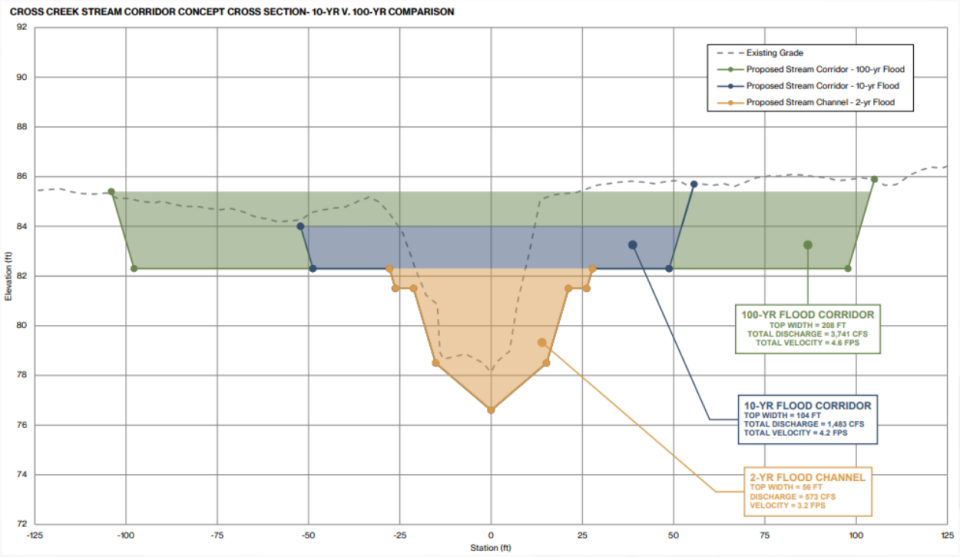
The lakebed of Roses Lake belongs to the Rose Lake Property Owners’ Association.
The state had the lake drained in August 1989 because its dam and spillway were in poor condition, and if the dam were to burst, the lake was predicted to flood Country Club Drive and downtown Fayetteville. It was classified as a high hazard.
Several weeks later, a storm dropped 8.25 inches of rain on Fayetteville in five hours, according to the archive of The Fayetteville Observer. Three dams burst around the city, and others were damaged. Flash flooding caused an estimated $10 million in damage to more than 100 homes and 100 businesses, and two children were killed. The downpour temporarily refilled Roses Lake, but the dam held despite its poor condition.
Over the years, Roses Lake refilled and was drained a number of times, but the residents never mustered enough money to make repairs. They asked the City Council to fix the dam but were turned down.
Another $213 million to curb flooding around town
The city staff presented the City Council with plans for projects to address flooding in other watersheds around the city. They total $213 million.
These areas include:
Little Cross Creek, between Murchison Road and Bragg Boulevard, 42 projects for $59 million.
The area around a creek in 71st School Road and Bingham Drive vicinity, 23 projects for $44 million.
Two areas near the Cape Fear River on the southeast corner of Fayetteville, 39 projects for $110 million.
Senior North Carolina reporter Paul Woolverton can be reached at 910-261-4710 and pwoolverton@fayobserver.com.
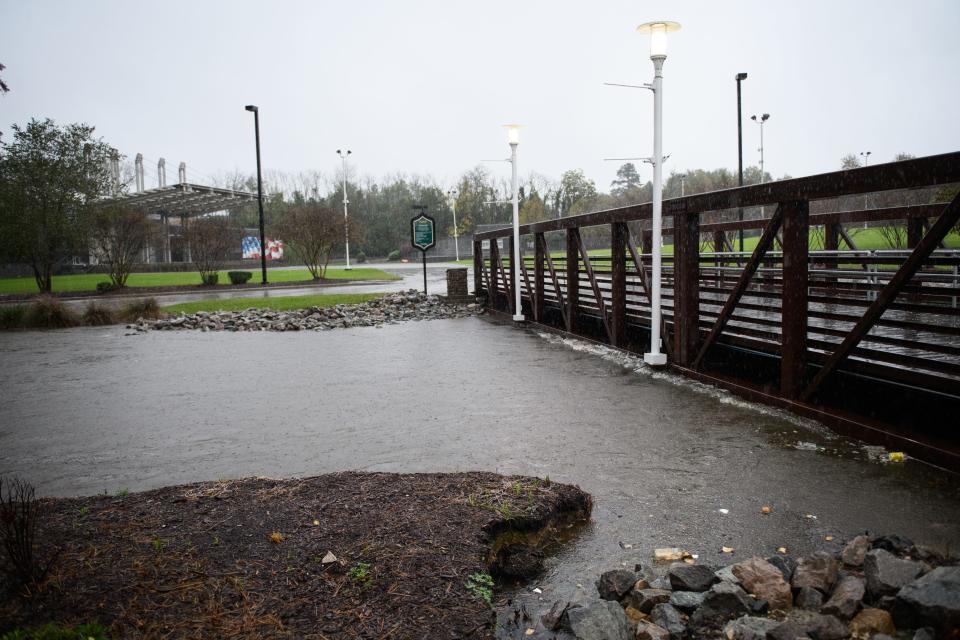
This article originally appeared on The Fayetteville Observer: Fayetteville, NC plans to spend half a billion to reduce flooding

